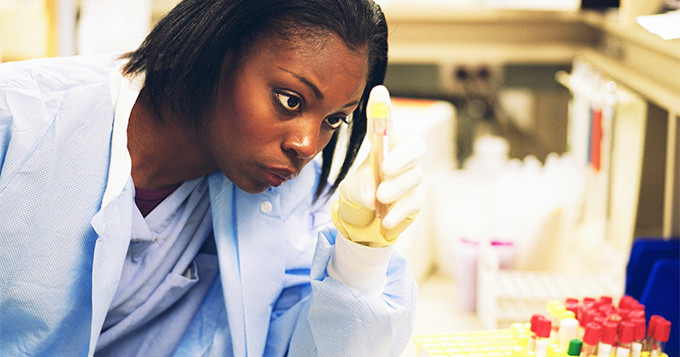
Black History Month 2019: Resilience in Science
By Arikana Massiah, Clinical Scientist
I am a Clinical Scientist in Microbiology with an interest in translational science particularly how we can use emerging technologies to improve the way we currently diagnose infections. As well as my Clinical Scientist role, I am also involved in the Microbiology Society as a Champion and I am part of their Professional Development Committee.
At the Microbiology Society Annual Conference in April this year I was invited to talk to the Early Career Microbiologist Forum on resilience in science. Whilst we are celebrating the achievements of our black scientists, it is important to highlight how resilience can help, black scientists to progress well and succeed their careers.
History is filled with “Hidden Figures” in science, who themselves being black and not at all represented in any professional groups, excelled in their careers and became pioneers in many respects despite facing insurmountable obstacles. As well as their astute knowledge, their flexibility and ability to adjust at all costs was the key to their success.
By embarking on a career in science, you take on a responsibility to work towards the improvement of science. There is a natural demand for high impact academic output and as such we are constantly assessed in order to progress. For black scientists however, this means embodying the “twice as good” speech that our parents drilled into us. Whilst Michelle Obama’s version of this speech to Tuskegee University graduates in 2015 may be depressing in parts, it is also a rallying call for resilience.
Moving to England completely changed how I viewed the opportunities available to me. Suddenly my name, where I was originally from, the colour of my skin, my accent or lack of it all seemed to somehow determine my success.
However, a lot has been done to ensure that discrimination is reduced and equal opportunities improved. The NHS Scientist Training Programme in Clinical Microbiology was the foundation on which I built my career so far. Yet, I was the only black trainee in Microbiology and there were no black trainers for that cohort. Suddenly representation mattered.
In June 2018, the Association for Clinical Biochemistry and Laboratory Medicine (ACB) published the findings of an equality, diversity and inclusion survey. Only 6% of HCPC registered members who responded to the survey stated ethnicities other than white. However, there was a broader spread of ethnicities within BAME categories.
As I progress in my career, I am getting used to being the only black person in the room. It is lonely and often discouraging. I realised if I want someone to represent me and my views I had to step into the room, be part of the conversation and hold the door open for others to get the same opportunities or even better. Whilst this is a short-term solution to a wider problem, it has enabled me to contribute to the development of science policy from introducing a focus on healthcare scientists within the Microbiology Society to participating in Parliamentary Links days where parliamentarians and scientists meet and discuss steps in developing our science policy.
A few things I have learned along the way, your health is your wealth and your knowledge is your power. You cannot work without both. I am grateful for my friends and family. Hold onto yours, they will keep you going during the low periods and it is equally important to celebrate with them. However, we cannot talk about resilience in science without talking about good leadership and mentorship.
I am incredibly lucky to have a few people who have mentored me through the years and continue to do so. Whilst searching for a single mentor maybe daunting for some, I think mentorship becomes more accessible when you are attentive and open-minded to what is going on around you. Bite-size pieces of advice, not just from your senior colleagues, can provide you with a wealth of wisdom or can give you just the right direction you need at a specific point in your career. I often find that I have more to learn from junior colleagues as they are more likely to have faced challenges similar to my own.
What is encouraging is the work that both learned and charitable Societies are doing on equality, diversity and inclusion. The NHS now has a BAME mentorship scheme and unconscious bias training is becoming a mainstay.
Whilst we are responsible for advancing our own careers, and therefore must build resilience, supporting a productive work environment is everybody’s responsibility. It is often said in many cultures that it takes a village to raise a child; well it takes another village to support a black scientist!
I wish you the strength to be resilient, soldier on and achieve your greatness. However, whilst you are on your journey, try to remember the time when you dreamed about achieving what you have now and celebrate your achievements!
Have you enjoyed Arikana’s article? Read more of the Science Council’s Black History Month blogs here.
